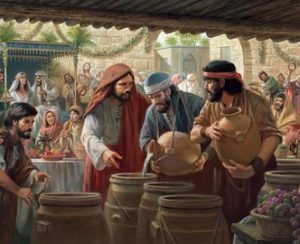John 2.1-11

Politicians do it all the time, when they have an announcement they pick the background setting to emphasize the message. In just the last week we had the prime minister crawling on a primary classroom floor to encourage parents to send their children back to school and then wearing a hard hat and luminous jacket to announce the reopening of Appledore shipyard. Of course, it can go ridiculously wrong such as when the prime minister was filmed hiding in a refrigerator to avoid questions. The PR people talk of getting the optics right. If then you were the Son of God and you wished to select the place for your first sign of the coming of your future kingdom, where would you pick? As it is a kingdom perhaps a palace would be ideal or maybe the temple. If instead of a building one wanted a natural setting how about the top of Mount Sinai with all its historical associations with the giving of the law. In addition, judging by modern leaders there would be some announcement to attract the crowds. The audience would be carefully selected to ensure the contemporary leaders were present to provide their endorsement.
Contrast this with Jesus who chose the wedding of an unnamed couple in a minor town in Galilee with no greater witnesses than his family and new disciples. When he changed the water to wine it was done without fanfare so the master of ceremonies did not even know it was happening. Yet it was this humble event and setting that has been recorded and preserved over two millennia. Jesus indicates the reason for the low key nature of the miracle is that people’s misconceptions about the coming Messiah would lead to unhelpful responses. However, this did not prevent Jesus performing numerous miracles or signs in the course of his daily ministry. John records that this was simply the first of his signs. v 2.11
The importance of the setting of a wedding is the place marriage has in the symbolic relationship God has with his people. The theme of marriage runs from the beginning of Genesis Genesis 2.24 into Revelation Revelation 19.7-9 as a God ordained relationship. Humans are made for intimate relationships that reflect the fellowship the Godhead has within themselves. The faithfulness of the marriage is intended to reflect the faithfulness of God to his people. In the Old Testament this is particularly the message of Hosea, where God through Hosea’s marriage demonstrates that he is faithful even when his bride is not and reconciliation between God and man is always possible.
A Christian marriage is intended by God to be in itself a witness to God’s faithfulness to his bride, his people. “Paul tells us that marriage is a mystery designed by God to show us Christ’s love for the church.” (Josh Moody, John 1-12 for you.) ‘Husbands, love your wives, just as Christ loved the church and gave himself up for her to make her holy, cleansing her by the washing with water through the word and to present her to himself as a radiant church, without stain or wrinkle or any other blemish, but holy and blameless.’ Ephesians 5.25-27
How then does a marriage reflect Jesus’ love for the church and how can the marriage partners foster that loving faithfulness for the rest of their lives?
What challenges are presented when only one of the married couple is a disciple of Jesus?
What pastoral support do we provide as a church for married couple to be a witness to the faithfulness of God?
Faithful one – Brian Doerksen




